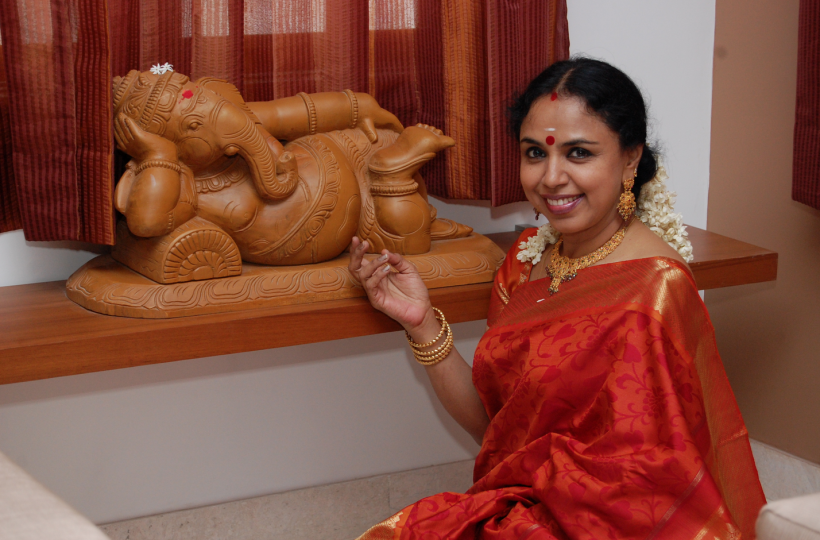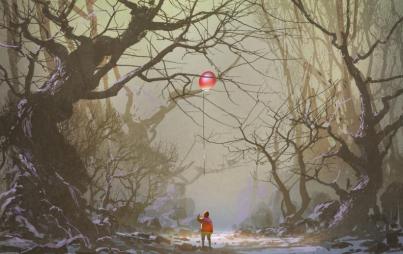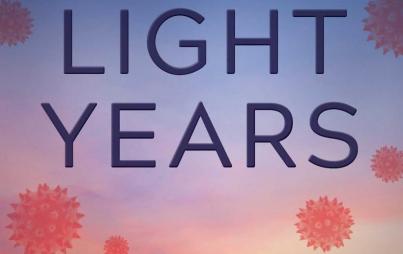
Before becoming known the world over for her enthralling voice, Carnatic music star Sudha Ragunathan nurtured dreams of becoming a doctor. Things took a dramatic turn when she was awarded a scholarship to study music under the great musician and vocalist, Dr. M. L. Vasanthakumari. Sudha became the star pupil of her legendary guru and provided vocal support to Dr. MLV for over a decade.
Following a meteoric rise, today she is considered one of the finest traditional Carnatic musicians. Sudha has participated in international music festivals and concerts held across the U.S., Canada, Europe, South Africa, Australia, New Zealand, South Asia, and the Middle East, and has received many awards at state, national, and international levels. She also founded the Samudhaaya Foundation to support the underprivileged with her music concerts. She is now working as a film music director for two upcoming movies.
Looking back at your musical career, what are the factors you think contributed to your success?
Lots of them, but what comes to my mind immediately is that as a youngster in college, I really worked hard to live up to my guru's expectations. There was no teaching in a formal atmosphere—we learned just while being with her at her concerts. I simply recorded her singing in my mind and kept learning from what I stored. It was a very challenging experience, but as I began learning very early from her, my mind was like a sponge and I could absorb whatever I heard. This has held me in good stead over the years. As a result, I'm able to consistently define and redefine my repertoire, be explorative, feel the pulse of the audience, chisel my music to suit tastes across ages and culture, and manage the varied stakeholders at a concert. Overall, the factors are faith, commitment, and achievement—in that order!
How competitive is the Carnatic music industry? What are the challenges you face as a female musician? Have you faced gender bias?
It is very competitive with a lot of talented new singers coming into the scene regularly. The audience looks forward to innovation in content. I continue to focus on what needs to be presented, how it needs to packaged as the innovative part has to be happening, and cater to tastes across generations.
And yes of course there is gender bias.
How did you land the opportunity of composing music for a movie? What is the type of music you'll be composing?
I have known director Vasanth for over a decade now. So when he brought to me this proposal I had no reservations in saying a yes when he discussed Sivaranjaniyum Innum Sila Pengalum. And then recently, his other movie Thanneer came about and I said yes to that as well! I am a Carnatic musician and my music would mostly be of Ilayaraja Sir’s mold, but I also am comfortable with having to use technology wherever necessary.
How would you compare the experiences of performing live and recording in the studio?
In a live performance, spontaneity and great presence of mind has to be foremost as there is really no opportunity for breaks and corrections, quite obviously. Gauging the pulse of the audience as the concert progresses, singing to requests—all of this is satisfying and the gratification is instant. A studio recording gives you the pace and space while the response has to be waited for.
You attended the Global Vocal Meeting in Germany where you represented the genre of Carnatic music among vocalists from various parts of the world—could you reflect on your experiences there?
At the Global Vocal Meeting at Lorrach, Germany, the organizers Burgh of Lorrach had got together singers from Madagascar, Lorrach, Hungary, Switzerland, Mali and the U.S. I was the only South Indian artist to have been invited. In this program of two hours, each artist presented his or her own individual style of music with the other musicians joining in. A Brindavani, a Keeravani, a Sankarabharanam, a Suddha Dhanyasi, a Madhyamavathi, and a Kalyani were all shaped to complement the music from other cultures—a Neelambari beautifully blended into a lullaby sung by a Hip Hop artist from Switzerland. Rehearsals ran for five days at the auditorium. On my request, I was allowed to sing with accompanists—Carnatic music is best projected that way, while some of the other participating musicians played their own instruments.
My presentation was a thematic, titled "Wedding in the Forest." The central point for this item was Harikesanallur Muthiah Bhagavatar's popular western note. The idea was to effectively use the different voices to recreate a forest atmosphere on stage and depict a wedding. Later we joined in with the other musicians—African music or gypsy music or church music, whatever it turned out to be, we joined in enthusiastically and mastered the pieces. I also tried fitting in charming raga phrases at the appropriate places in their songs. The Western artists and the audience went into a trance when they experienced south Indian music.
What is it that keeps you looking eternally young and bright?
My self discipline and my guru’s blessings! Guru MLV Amma's constant advice sets me apart when on stage—it’s not only about singing but also about how you present yourself. The appeal must not only be aural but visual as well! I pack as much in a day and practice as much as I can. I am extremely conscious of what I eat, I workout, and ensure that I remain healthy and happy within, which will reflect on my external being.
What are your plans for the near future as a musician and as a person?
I eventually would want to build a school that represents Guru MLV Amma’s style of music. I am working continuously on taking Carnatic music from thousands to millions of people across all segments of life—I've sung in government schools, in old age homes, as well the prisons in Chennai. Music is indeed the language of the universe and a common bond that can bring people of different backgrounds together. I'm also planning on doing some research on music in the field of medicine.
What advice would you give to young girls aspiring to take up music as a career?
Youngsters should not be in a hurry to start performing. Hastening performance indirectly results in much less time for focused learning. They must learn as much as possible and wait for the guru's approval to perform. What eventually reflects a fine artist is the quality, the dedication, and the consistency of performance.






